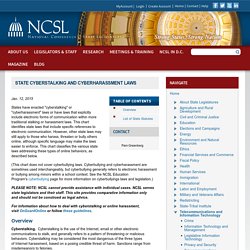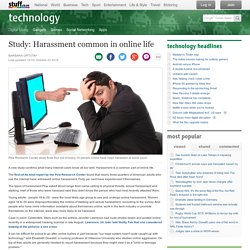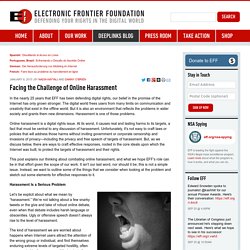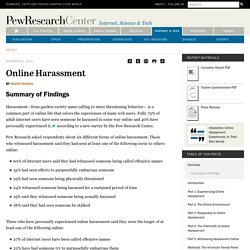

Stalking_article. Cyberstalking and Cyberharassment Laws. Jan. 12, 2015 States have enacted "cyberstalking" or "cyberharassment" laws or have laws that explicitly include electronic forms of communication within more traditional stalking or harassment laws.

This chart identifies state laws that include specific references to electronic communication. However, other state laws may still apply to those who harass, threaten or bully others online, although specific language may make the laws easier to enforce. This chart classifies the various state laws addressing these types of online behaviors, as described below. (This chart does not cover cyberbullying laws. PLEASE NOTE: NCSL cannot provide assistance with individual cases. For information about how to deal with cyberstalking or online harassment, visit OnGuardOnline or follow these guidelines. Overview Cyberstalking. Cyberharassment. State Statutes * Statute does not specify "electronic" or "Internet," but refers to "telephoning, contacting, or otherwise communicating...
" Working to Halt Online Abuse. If you are receiving death threats or believe yourself or your children to be in immediate physical danger, please dial 911 immediately.

While we will be happy to help you or law enforcement officials trace messages you've received online, we cannot be there physically to protect you and we cannot guarantee an immediate response to your request for help. You must clearly tell the harasser to stop Generally speaking, it is unwise to communicate with a harasser. However, as soon as you determine that you are truly being harassed by someone, you must very clearly tell that person to stop. Simply say something like "Do not contact me in any way in the future" and leave it there. Save everything One of the first impulses many harassment victims have is to just delete any communications they've received, and that's a bad idea. Complain to the appropriate parties It can at times be a little difficult for people to determine who the appropriate party is.
Determine your desired result. Harmful Digital Communications Bill passes into legislation. Harassment Act 1997 No 92 (as at 03 July 2015), Public Act Contents. The Rise of Online Harassment. Study: Harassment common in online life. Last updated 14:33, October 23 2014 Pew Research Center study finds four out of every 10 people online have been harassed at some point.

A new study confirms what many internet users know all too well: Harassment is a common part of online life. The first-of-its-kind report by the Pew Research Center found that nearly three-quarters of American adults who use the internet have witnessed online harassment. Forty per cent have experienced it themselves. The types of harassment Pew asked about range from name-calling to physical threats, sexual harassment and stalking. Young adults - people 18 to 29 - were the most likely age group to see and undergo online harassment. Case in point: Celebrities. It can be difficult for police to go after online bullies in part because "our legal system hasn't quite caught up with technology," said Elisabeth Dowdell, a nursing professor at Villanova University who studies online aggression.
"But the internet has no age limits," Dowdell said. Facing the Challenge of Online Harassment. In the nearly 25 years that EFF has been defending digital rights, our belief in the promise of the Internet has only grown stronger.

The digital world frees users from many limits on communication and creativity that exist in the offline world. But it is also an environment that reflects the problems in wider society and grants them new dimensions. Harassment is one of those problems. Online harassment is a digital rights issue. At its worst, it causes real and lasting harms to its targets, a fact that must be central to any discussion of harassment. This post explains our thinking about combating online harassment, and what we hope EFF's role can be in that effort given the scope of our work. Harassment Is a Serious Problem Let’s be explicit about what we mean by “harassment.”
These kinds of harassment can be profoundly damaging to the free speech and privacy rights of the people targeted. Online Harassment. Harassment—from garden-variety name calling to more threatening behavior— is a common part of online life that colors the experiences of many web users.

Fully 73% of adult internet users have seen someone be harassed in some way online and 40% have personally experienced it, according to a new survey by the Pew Research Center. Pew Research asked respondents about six different forms of online harassment. Those who witnessed harassment said they had seen at least one of the following occur to others online: 60% of internet users said they had witnessed someone being called offensive names53% had seen efforts to purposefully embarrass someone25% had seen someone being physically threatened24% witnessed someone being harassed for a sustained period of time19% said they witnessed someone being sexually harassed18% said they had seen someone be stalked.